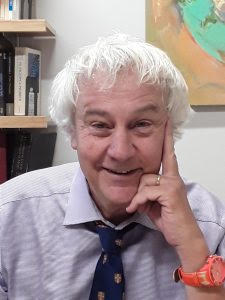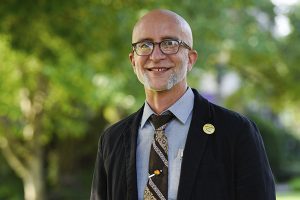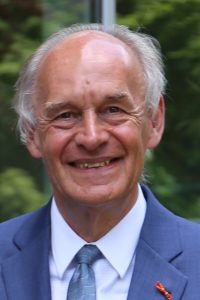 Raphael Lataster holds a PhD from the University of Sydney, and occasionally lectures there and at other institutions. His main academic research interests include misinformation, disinformation, and fake news, in Health, Media, and Religion. He enjoys discussing and considering different political and religious points of view. We invited him to discuss comparative philosophy of religion as part of our “Philosophers of Religion on Philosophy of Religion” series.
Raphael Lataster holds a PhD from the University of Sydney, and occasionally lectures there and at other institutions. His main academic research interests include misinformation, disinformation, and fake news, in Health, Media, and Religion. He enjoys discussing and considering different political and religious points of view. We invited him to discuss comparative philosophy of religion as part of our “Philosophers of Religion on Philosophy of Religion” series.
Abstract
With the developed world ever keen to ground its decisions in science and scientific reasoning, theism has come under the microscope, with sophisticated theologians using science to argue for its truth. Summarising my earlier work, I explain how the very science used to argue for theism’s truth, as well as the science left by the wayside, actually reveals theism to be extraordinarily improbable, particularly when the many alternatives to theism popular throughout the rest of the world are considered.
Introduction
Most Anglophone scholarship on the divine concerns itself with God, the god of classical theism. A god that is all-good, all-powerful, and all-knowing. A god that is the Creator of all else (with the Creation crucially arising out of nothing) and is apart from all else. A god that is free, perfect, necessary, and desirous of relationships with us.
The rise of science has for the most part worked against the belief in God. The more scientific and educated a society, generally the less the belief in God. Science, after all, tends to concern itself with the observable, and somehow God continues to be just out of reach, perceptible only to those who find him in the indirect: a prayer apparently answered, something going right for once, or a rustling in the leaves when a sign has been asked for. Nevertheless, sophisticated theologians have been using scientific evidence and approaches to argue for the existence of God. For example, Richard Swinburne endorses a scientific, Bayesian, approach to argue for God’s existence (Swinburne 2010), and William Lane Craig employs scientific evidence in syllogisms for public consumption (Craig 2008). Countering them are other philosophers arguing that God’s existence is very improbable, as the available evidence supports both naturalistic and even supernaturalistic alternatives (see Philipse 2012 and Lataster 2018). We will consider the atheological arguments such as the argument from evil, but first, a brief critique of the typical arguments utilised by theistic scholars to demonstrate the truth of God’s existence.
Arguments for God’s Existence
It is typical in the Analytic Philosophy of Religion, from the atheistic or naturalistic perspective, that arguments for theism are undermined, and naturalism is offered up as a superior hypothesis. I do work in this manner but also show that supernatural alternatives to theism, typically mainstream in the developing world, also are superior to theism, in regard to the evidences or arguments in question. Though it is not generally considered evidential, I shall start with the cosmological argument from contingency, for completeness. This argument begins from the assumption that the world exists and is contingent, continuing with the notion that there must be some necessary explanation for this, concluding that a necessary God provides that explanation. A typical naturalistic retort might be that it is inadequate to simply assume that the world is contingent; perhaps it is necessary, and thus requires no external explanation in the same way that God is supposedly God’s own explanation. From the perspective of an alternative supernaturalist, it is not at all obvious that the supposed necessary being behind the unnecessary world is God. It could just as easily be some other god or gods. Pantheism, for example, would appear to offer a necessary god, by definition, echoing certain theologians’ penchant for tautologies.
Moving on to evidential arguments—arguments that rely on scientific evidence—let us consider the kalām cosmological argument. This argument effectively says that since the world began to exist, its coming into existence must have been caused by something; something that itself is uncaused and beginningless in order to avoid an infinite regress; something assumed to be God. This argument assumes much that many scientists and philosophers would not be content to accept, but for brevity we shall place most focus on the premise that the world began to exist. Philosophical reasons for supposing that the universe began to exist have been offered and tend to rely on controversial and ultimately unknowable premises on infinity and/or tensed views of time. Interestingly, philosophers of time tend to favour tenseless models. More interesting to us, however, is the scientific evidence for supposing that the universe began to exist.
This is generally the evidence of the Big Bang Theory, which ostensibly provides the perfect mechanism for the universe popping into existence from nothingness, supporting not only a creationistic theism (see Genesis 1), but also the typically important creation ex nihilo. However, this ascribes far more to the currently available evidence than what is justified. The Big Bang Theory does not at all prove that the world came into existence, out of nothing. Instead, it suggests that roughly 14 billion years ago the singularity underwent a period of expansion. What the singularity is exactly, how ‘long’ it might have been ‘there’, whether the universe is part of a greater multiverse, or oscillates between expansion and contraction modes, or came from nothing or something else, is all unknown. As such, the argument simply does not work. Naturalism remains plausible. And, as will be the case with all these arguments, even if there was enough here to indeed point to a divine being, it needn’t be God, or even one god. The creator could just as easily be an evil god, for example, a god happy to fill the world with all sorts of inefficiencies and gratuitous sufferings, perhaps for its own sadistic entertainment, as will become relevant later.
Moving on, let us consider the argument from fine-tuning. It shall here be assumed that the world is indeed fine-tuned, that several universal constants are just such that it allows us to be alive. One minute change here or there and we simply could not exist. To the theistic proponent of this argument, this fine-tuning is by design, which means that there is a designer, namely, God. Unfortunately, naturalistic hypotheses are too hastily dismissed by the sophisticated theologians, such as that this is all due to chance, or that this is all necessary. The latter reminds us of the argument from contingency, where crucial premises are merely assumed. The former is undoubtedly plausible; no matter how extraordinarily implausible, anything even remotely possible is well, possible. And if we grant that there is some form of eternity, then even the most unlikely happenings should be happening, even an infinite number of times. And these hypotheses are brushed aside by proponents of this teleological argument without a smidgen of direct evidence for the design hypothesis. Furthermore, the hypothesised designer needn’t be God. It could even be a council of gods.
Less impressive than the cosmological or teleological arguments are the moral arguments, which tend to move from the assumption of objective morals, to the ultimate moral lawgiver, God. Again, these arguments make assumptions that not everybody accepts, certainly not the scientists of the world. For example, it is not universally accepted that objective morals exist. Incredibly, some attempts to demonstrate that they do exist rely on appeals to subjectivity. Furthermore, there is the assumption that the existence of objective morals would mean that there was a moral lawgiver. It is not at all obvious, as I pointed out in my monograph, that objective morals could not simply be a feature of the (possibly) necessary universe. Less relevant, but interesting for those concerned with Christianity and other theistic religions, is that the Abrahamic holy texts contain contradictory and awful (by today’s standards) moral values, teachings, and acts. For example, the Biblical book of Job has God’s loyal servant Job and his family torn apart and destroyed for the simple crime of Job being God’s loyal and faithful servant. More relevant is that, once again, the hypothesised lawgiver needn’t be God. An evil, or at least a morally indifferent, god would be a better fit for such nastiness.
Ontological arguments are a priori, but we shall discuss them briefly for completeness. They are crucially important to the case for God’s existence since the evidential arguments, insofar as they might work, do not actually demonstrate the existence of the omni-being known as God. At best they only inform us that a creator exists. A designer exists. A moral lawgiver exists. And so forth. They do not inform us that there is only one god; that all these roles are fulfilled by this one god; that this being is omnipotent, omniscient, and omnibenevolent; or that this being is perfect or maximally great. The ontological arguments do just that. However, they are widely discredited as they are speculative and tautological, mere word games playing on notions of conceivability and possibility, without a shred of actual evidence that the being in question actually does exist. And again, this hypothesised maximal being needn’t be God. Indeed, in my earlier work I have argued that a pantheistic god would be a better candidate since surely the greater god is the one that is not bound by what it is not – on pantheism there is nothing that exists that is not part of the divine being.
There are also personal religious experience arguments. However, these arguments rely on positing far more than is necessary to explain occurrences that are just as easily (or better) explained by naturalistic – or even alternative supernaturalistic – causes. I have even argued earlier that the great diversity of such experiences would be more consistent with numerous gods, or one that isn’t so benevolent or powerful, than the all-powerful God of theism that wants us all to believe in him.
Related to these arguments are those revolving around miraculous claims, such as that Jesus was resurrected. As with the personal religious experience arguments, arguments from miracles also tend to revolve around phenomena that are just as easily (or better) explained by alternative – naturalistic and supernaturalistic – hypotheses. Regarding Jesus’ resurrection, mainstream scholarship already accepts that much of what is found in the Gospels is fictional. Some have even made serious academic attempts to show that it’s essentially all fictional, that Jesus may not even have existed as a historical person (see Lataster 2019). Miraculous claims are especially problematic in the sense that they are supposed to appear very improbable, and so demonstrating them as probable is pretty much impossible, by design. For example, consider the miraculous event involving Elijah and the priests of Baal. Elijah goes to such extreme lengths to rule out naturalistic hypotheses, such as having his offering drenched with water (1 Kings 18). Likewise, there is nothing impressive about Jesus walking on the ground. Walking on water, however, that’s a miracle (Mark 6:45-53). Why is the latter a miracle but the former is not? Because people don’t walk on water. It’s highly improbable, if not impossible. That’s the sort of thing that would have people thinking that a miracle has occurred, and have them ready to embrace whatever divine being was responsible.
Arguments against God’s Existence, and alternatives
Having briefly gone over the lack of scientific support for God’s existence, it is time to consider if the available evidence actually works against God’s existence. I believe so and shall start with a consideration of the argument from hiddenness. This argument, like all good evidential atheological arguments, relies on some evidence, some observation, some morsel of information that doesn’t quite make sense if God exists, but makes perfect (or simply more) sense if God doesn’t. And that includes naturalistic and supernaturalistic alternatives. The evidence in this case is the existence of non-believers, such as myself. It’s a curious thing, given that the god of theism allegedly revealed/reveals himself to humanity, and wants a relationship with all of us, and in most theistic religions, wants to save us, usually from ourselves and/or the devil. If God is all-knowing, he knows that non-believers exist. If God is all-good, he’d realise that it’s better for us all to know he exists and would do everything in his power to make it so. But God is all-powerful, meaning that God could easily ensure the ultimate outcome, and yet it is not so. And that’s weird. Not impossible. Not entirely inexcusable. But weird, odd, strange. In the language of science and mathematics, it is improbable. Excuses involving appeals to free will and the like do not help, as it is still strange, hence the very need for excuses. It is not strange on naturalism, however.
If naturalism were true, the lack of belief in God is not at all strange. It would be 100% expected. Nor would it be strange that there is some belief in God. After all, different people have different genes, different experiences, different opinions, and come up with different solutions to the problems they face. So, if naturalism were true, we would expect to see some belief and some non-belief. And that is exactly what we see. This means that this scientific evidence amounts to a probabilistic point against theism. It isn’t necessarily a probabilistic point for naturalism, however (except in the relative sense). For if deism were true, the divine hypothesis involving a God-like god that isn’t keen on revelations, we would also expect to see the observed bricolage of non-belief and belief of many stripes. On theism, it is strange, it is less probable that we would observe unbelief (and incredibly diverse belief) in the world. On naturalism and other alternatives like deism it is perfectly expected, it is thus more probable that we would observe unbelief (and diverse belief) in the world.
(To clarify, we have here focused on ‘positive evidence’, namely the unbelief found in the world. But we could just as easily refer to ‘negative evidence’, the lack of direct evidence for God’s existence. It is often assumed that a lack of evidence is not evidence of a lack, but in regard to epistemic probabilistic reasoning, it certainly can be. For example, on the hypothesis that a nuclear explosion occurred in my office 5 minutes ago, we would expect to see debris and gore everywhere, as well as altered radiation levels. Instead, we see that my office is as ordered as ever, if a little messy. No unexplained gore or radiation to be found here, apart from a colleague’s accusation that I absolutely murdered my lamb vindaloo, for which I am now paying the price – as are my colleagues. Hence, I am in possession of good evidence that a nuclear explosion did not occur in my office 5 minutes ago.)
Similar things can be said about the apparent lack of efficiency—dare I say ‘poor design’—we observe in the universe. For example, whales have finger bones. Giraffes have excessively long laryngeal nerves. Humans suffer from all manner of back and teeth problems, with males having nipples, presumably for all the breastfeeding they don’t do. Additionally, the universe is extraordinarily vast and old, quite unnecessary if the ultimate purpose of its existence is for humans to make a choice between God and not-God. The latter is so obvious, famed theistic philosopher William Lane Craig has admitted, “just as the smallness of the universe supports theism, so also the vastness of the universe supports atheism… the vastness of the universe increases the probability of atheism… the vastness of the cosmos does count against theism” (Craig 2015). On naturalism, inefficiency and seemingly bad design would not at all be surprising. Similarly, supernaturalistic hypotheses entailing the existence of less than perfect gods would better explain such phenomena than classical theism with its perfect God. We could go on, but we shall finally shift the focus to the problem of evil.
The basic idea behind the problem of evil is that it appears problematic that God exists while evil also exists. Or to be precise, not necessarily ‘evil’, whatever that actually is (and far be it for me, a disbeliever in objective morality, to do so), but apparently gratuitous suffering exists. For example, toddlers who are injured and die young, animals being ripped apart by other animals unbeknownst to us, entire species becoming extinct, and so forth. We shall overlook the logical argument from evil, as it is always possible that God does have some good but unknown reason for allowing such. We instead focus on the evidential argument from evil, which is far more powerful, and is also more appropriate given the themes of this special issue. This evidence of gratuitous suffering is at least a little surprising if God exists. After all, God would have the knowledge that it exists, wouldn’t want it to exist, and would have the power to end it at once. Yet here we are, surrounded by evils, by gratuitous sufferings.
This is a probabilistic problem for theism because it is at least a little bit surprising. However, this is not at all a problem for naturalism. Naturalism lacks an all-knowing, all-good, and all-powerful god, so seeing some mixture of good, non-gratuitous evil, and gratuitous evil is perfectly expected. That means that this is a probabilistic point against theism, and for naturalism, in a relative sense. But it is not only naturalism that has theism beat on this front. Alternative supernaturalisms, entailing that the divine being (or beings) is a little good, or a little evil, or morally indifferent, or all-good but not as savvy or powerful, and so forth, better fit the evidence of gratuitous suffering. It is surprising that gratuitous suffering exists not because there is apparently a god that exists, but because that god is supposed to be omnibenevolent, as well as omniscient and omnipotent. So, there are both naturalisms and supernaturalisms that better fit the available scientific evidence than classical theism does. The problem of evil, in its evidential form, is a serious problem for theism, though not so much for certain alternatives.
Conclusion
The typical and historical arguments for God’s existence are not good arguments. The scientific evidence employed in these arguments does not support the arguments’ conclusions that God’s existence is probable. In fact, this evidence, along with other evidences, fits just as well or better on both naturalistic and supernaturalistic alternatives to classical theism. The evidences behind arguments against God’s existence, however, were found to successfully lower the probability of God’s existence. For example, the evidences of non-belief and inefficient design are at least somewhat surprising (if not nearly impossible) on theism, but perfectly expected on alternatives like naturalism, deism, etc. Likewise, the problem of evil. The presence of gratuitous suffering in the world is at least a little surprising on classical theism. It is perfectly expected, however, on various naturalisms and alternative supernaturalisms, particularly those involving a sub-maximal god or gods.
The currently available scientific evidence clearly supports naturalistic, and even supernaturalistic, alternatives to classical theism, at least in the relative sense.
References
Craig, WL. 2008. Reasonable Faith, 3rd ed. Wheaton, IL: Crossway Books.
Craig, WL. 2015. Does the Vastness of the Universe Support Naturalism? http://www.reasonablefaith.org/does-the-vastness-of-the-universe-support-naturalism. Accessed 17/01/2023.
Lataster, R. 2018. The Case Against Theism. Cham, Switzerland: Springer.
Lataster, R. 2019. Questioning the Historicity of Jesus. Leiden: Brill.
Philipse, H. 2012. God in the Age of Science? Oxford: Oxford University Press.
Swinburne, R. 2010. Is There a God?, Revised ed. Oxford: Oxford University Press.
 Evan Fales is Emeritus with the philosophy department at the University of Iowa, where he taught for 43 years. His work includes articles on various topics in Philosophy of Religion, and two books in the area, Divine Intervention: Metaphysical and Epistemological Problems (2015), and Reading Sacred Texts: Charity, Structure, Gospel (2021). We invited him to discuss comparative philosophy of religion as part of our “Philosophers of Religion on Philosophy of Religion” series.
Evan Fales is Emeritus with the philosophy department at the University of Iowa, where he taught for 43 years. His work includes articles on various topics in Philosophy of Religion, and two books in the area, Divine Intervention: Metaphysical and Epistemological Problems (2015), and Reading Sacred Texts: Charity, Structure, Gospel (2021). We invited him to discuss comparative philosophy of religion as part of our “Philosophers of Religion on Philosophy of Religion” series.








